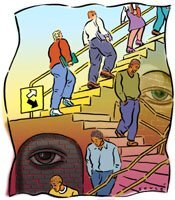“Does segregation of children in public schools solely on the basis of race, even though the physical facilities and other ‘tangible’ factors may be equal, deprive the children of the minority group of equal educational opportunities?
“We believe that it does.”
— Chief Justice Earl Warren, in the U.S. Supreme Court’s 1954 decision in Brown v. Board of Education of Topeka
— Bob Soule

The national high school graduation rate for African-American boys is only 60 percent of that for white boys, and the gap between the two in some states reaches nearly 50 percentage points. Some commentators have attributed these and related outcomes, such as similar gaps in test results, to cultural issues within the black community. Yet graduation rates for black girls are, in many states, nearly the same as those for white boys (and occasionally higher), as are their test results and other achievement measures.
The cultural argument becomes unconvincing, on the face of it, when there are such different outcomes for children from the same homes. It becomes, to use the vocabulary in which the argument is usually couched, a matter of black boys, but not black girls, eschewing academic achievement out of fear of “acting white”; black boys, but not black girls, using a dialect that restricts their communication with teachers; black boys, but not black girls, being unaware of behavioral expectations in school. Such multiplication of hypotheses points to fundamental problems with the underlying theory.
The data indicate that segregated schools do worse than integrated schools, and big schools do worse than smaller schools. Big, segregated schools do worst of all.
Rather than focusing the search for the causes of the lack of educational success for many African-American boys on those least in control of the relevant social forces and institutional structures, other commentators, notably former Chief Justice of the United States Earl Warren half a century ago, and the award-winning writer and social critic Jonathan Kozol today, have suggested looking at forces and structures outside the control of black children and families, but well within the control of governments and electorates.
Kozol, in his recent book The Shame of the Nation: The Restoration of Apartheid Schooling in America, points out with his usual passion that many black and Hispanic students attend schools where there are very few nonblack or non-Hispanic students. In this, he is joining a now considerable group of academic researchers who have been documenting this issue. As a contribution to those studies, I have been looking at some data which are suggestive concerning the effects of segregation on African-American boys, that most vulnerable group whose educational achievement Rosa A. Smith, the president of the Schott Foundation for Public Education, has called the “litmus test” for our schools.
According to data collected by the National Center for Education Statistics, some 3,800 high schools in the 2000-01 school year had at least 100 black students. If we look at the number of black boys enrolled in grade 9 in those schools that year, and then at the number enrolled in grade 12 four years later, in 2003-04, we can observe the cumulative dropout numbers for grades 9, 10, and 11—a crude but fundamental measure of the effectiveness of the efforts by public schools to educate black boys. (Since these are national data, the usual provisos about transfers and such do not obtain.)
The NCES data show that the nearly 300 American high schools that are 90 percent or more black lose, on average, half their black boys between grades 9 and 12. On the other hand, schools that have smaller proportions of black students lose a smaller percentage. The least segregated American high schools with significant African-American enrollments lose approximately one-quarter of their black male students from grade 9 to grade 12, half that for segregated schools.
The most segregated American schools are to be found in the South and in the North, in cities and in small towns, in districts with higher-than-average per-student expenditures and in districts with lower-than-average per-student expenditures. Many are in Alabama; more are in Illinois. South Carolina is well represented, as is New York City. Florida, with the most African-American students among the states, has many of these extraordinarily segregated, low-performing high schools.
In New York City, for example, which enrolls more African-American students than any other district, among the 11 high schools that were 90 percent or more black in 2000-01, one—just one—relatively small school got more than half its black male students into grade 12 by 2003-04. In the city’s big high schools, it was twice as likely that a black male student would be missing from the senior class than present, and three times as likely that he would not get a diploma with his cohort than that he would.
If we look at it the other way round, there are 32 New York City high schools where black male students have a better than even chance of conventional progress from grade 9 to grade 12. Of those, all but two either have fewer than 100 black male students or are less than half African-American. Two out of 32. New York City high schools where black male students have a 50-50 chance of conventional progress from grade 9 to grade 12 enroll about 10,000 of the city’s African-American high school students. The others enroll about 90,000 black students.
These data indicate that, in general, segregated schools do worse than integrated schools, and big schools do worse than smaller schools. Big, segregated schools do worst of all.
To return to our original question: Does segregation of children in public schools solely on the basis of race deprive the children of the minority group of equal educational opportunities? It does. Why, then, does the practice continue?




